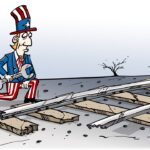(Reuters) – Pakistan’s anti-corruption agency arrested former prime minister Imran Khan at Islamabad High Court on Tuesday, threatening fresh turmoil in the nuclear-armed country as clashes erupted between Khan supporters and police, killing at least one protester.
Khan’s arrest comes a day after the powerful military rebuked him for repeatedly accusing a senior military officer of trying to engineer his assassination and the former armed forces chief of being behind his removal from power last year.
Dozens of paramilitary troops in riot-control gear surrounded Khan – Pakistan’s most popular leader according to opinion polls – and led him into a black van by his arm.
Authorities in three of Pakistan’s four provinces imposed an emergency order banning all gatherings after Khan’s supporters clashed with police, blocked major roads in a string of cities and stormed military buildings in Lahore and Rawalpindi, according to witnesses and videos shared by his party.
Reuters could not independently verify the authenticity of the videos. The military’s public relations wing did not immediately respond to a request for comment.
The clashes killed one of the protesters and injured 12 people, including six police officers in the southern city of Quetta, provincial home minister Ziaullah Langove said.
Pakistan’s telecommunications watchdog told Reuters that mobile data services were being suspended on interior ministry orders, while Netblocks, a global internet monitor, said access to Twitter, Facebook and YouTube had been restricted.
Khan, 70, a cricket hero-turned-politician, has showed no sign of slowing down since being ousted in April 2022 as prime minister in a parliamentary no-confidence vote – even after being wounded in a November attack on his convoy as he led a protest march to Islamabad calling for snap general elections.
His arrest came at a time when Pakistanis are reeling from the worst economic crisis in decades, with record high inflation and anaemic growth. An International Monetary Fund bailout package has been delayed for months even though foreign exchange reserves are barely enough to cover a month’s imports.













